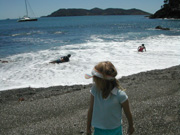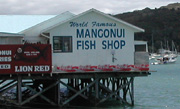The first time I saw Robert Muldoon in the flesh, I was mildly shocked. He had the skin of no pallor I had seen before on any mortal. It was the start of my first year at University and we were in the Botanical Gardens watching the friendly cricket match the parliamentarians have each year.
The Prime Minister and an MP or two came ambling through the crowd with a collection basket. I couldn't tell you who the others were because I was transfixed by the unhealthy state of our leader. The man was yellow! And round! He had to be almost as broad as he was high. He was also, I have to say, disarmingly amiable to one and all, and it took me a good half an hour to get back to my default position of seething at the mere thought of him.
How long ago? With the celebrated exception of the occasional returning student, most of the students who will be starting university this month were neither born then nor would be for, Oh-Fuck-Me-That-Can't-Be-Right-But-Dear-God-It-Is another ten years.
No politician I've seen lately has had anything like Muldoon's colour. Quite a few of them are no strangers to the gym. But all the same, it's still not a regime that lends itself to keeping yourself in trim. So hats off to Mr Dover Samuels for looking in surprisingly good nick at home at his motel in Matauri Bay when we sauntered in there last Saturday morning to pick up a brochure. It was a perfect day in the Far North. Here's a picture so I don't have to draw on my modest powers of descriptive prose.

No picture of Dover though. He was in sunglasses, baseball cap and speedos. And if you're thinking I really don't want to draw that picture in my mind, well: at ease soldier. He was looking buff. It's a rare politician who can manage that.
We were on holiday in the Far North, because one of us would be giving a speech on Waitangi Day. We love it up there. Within half an hour of leaving Matauri Bay we would be at the Mangonui fish shop. More pictures.

This is, has always been, and will probably always be, the best place in the world to eat fish and chips. I could not live there. My heart and I would come to a bad end.
We body surfed at Coopers Beach. We went to the Farmers Market in Kerikeri and had crepes for lunch. We had dinner at the Jerusalem Restaurant. I took a run past the Stone Store. We took pictures of a development along the road from the property Mum and Dad once had there. Mary-Margaret swam up and down the swimming pool whenever she could.
And then on Sunday night I drove down to Whangarei on a road I've covered many nights before, to do something I'd never done before in the town, and that was: talk politics. When I lived there in the 80s my only concern was gaining market share for Dominion Breweries. You meet different people when you go there to talk about the place of the Treaty in any future constitutional arrangement.
You might imagine that few people would be inclined to come out to hear a group of speakers on that subject on a Sunday night in the middle of a long weekend, but you'd be wrong. It was a decent-sized room and it was standing room only. To be sure it was largely a gathering of the progressive faithful: Network Waitangi is a group of Whangarei citizens, mostly Pakeha, who have gathered in solidarity with the Tangata Whenua over Treaty issues. And more power to them I say.
They had been invited to bring some speakers - five of us - to Te Tii Marae on the morning of Waitangi Day. This would serve as something of a preview of those performances. It was a good natured affair, all civility and warm humour. Someone thought Muriel Newman might be joining us to give it a bit more pepper, but she didn't show.
I offered some thoughts on the proposition that we had a philosophical impasse to contend with, in terms Andrew Sharp has described that suggest our best option is to go on fudging policy development and agreeing to endlessly negotiate while we wait to see what might come of the impasse. Or to put it another way: let all the parties stay at the table and agree to keep talking. I'll put a copy up here if there's any interest.
Jane Kelsey gave a fairly lacerating performance in the style you'd expect with a few solid serves at the multinationals while Reverend Bob Scott, Dr Betsan Martin and David James offered more optimistic thoughts.
And the next morning we met at Te Tii Marae to do it all again.
All my life I have blithely worked on the principle that it's safe to agree to do anything, regardless of how little you know about it and then adapt as necessary. This would be one of those times. Protocol's fine: I've trailed in behind others before and relied on others to offer the necessary words, challenges and waiata, but I've never actually stood on a marae and spoken myself.
Oddly enough, when I got to my feet and made my way across the ground to the microphone, I realised it resembled nothing so much as the experience of presenting a trophy at the races. You're down in the birdcage, the crowd is hundreds of metres away from you in the stands. You can't hear them and you can barely make out their faces. If you're used to reading a crowd and taking your cues from their responses, the sense of separation can be a weird and disconnected sensation.
Here, the crowd was a little nearer, and more audible, but it was early: about 9am, and we were up first. The crowd was still relatively thin. The organisers had judged from the evening's speeches that I'd be contributing the ad-lib humour, so they slotted me in the middle to keep things bubbling along.
I knew I had one joke available because in the introduction of the speakers, the title "Bullshit Backlash and Bleeding Hearts" appearing in the midst of a stream of reo had got a good laugh. So I used that as an opener and got some chuckles. But I realised it was going to be very hard to do any more than that when it was hard to hear or see the response, and so I switched to Solemn, and truncated what I had to say, working on the basis that you'd be some poor orator to stand there clasping pages of notes.
I don't know; I'd say it was workmanlike. People said nice things, but you can tell when you've only connected rather than lit any kind of fire.
I realised as I sat then for the next few hours and watched some truly powerful oratory that I'd had an opportunity to be grateful for. I'd got to have the experience with trainer wheels on. I was just one of many. There were no great expectations. I'd had the chance to grasp the dynamic of the thing.
People come and go. Speakers can be brief, they can be long-winded. They can be incisive, they can be meandering. They can be pungent, they can be downright loopy.
It was a fascinating crowd to be amongst. I sat alongside Annette Sykes who was maybe a little intense, but cordial and cheerful all the same. But on her feet? All afire. None of the truly incendiary stuff that once got her in trouble, but some pretty bolshy stuff all the same. And likewise Jane Kelsey. The pair of them had no trouble reading the crowd, and did they ever get the responses.
"Don't expect miracles from having four Maori Party MPs", they said. "Don't assume this resolves everything".
Hone Harawira was the genial commander, getting about the crowd inviting people to "get up and have a blat", and interrupting the speeches at one point to let a young boy take the mic to ask his brother Gabriel to return to the family car "emergently".
Cheerful and courteous, Mike Smith was shooting it all for video. "I'll never live that chainsaw down," he says, "But you'd be amazed how many people tell me 'I wanted to do that too bro.'"
The crowd kept building. Politicians came and went, although the PM kept herself busy out on the water, and then on the other side of the fence walking around the stalls. Backpackers, visitors, white faces, brown faces, children, most people in hats, and all finding the shade as the heat came on. What they saw was civil debate. What they never saw was tension.
By lunchtime Hilda Harawira was at the mic asking "are we going to be doing a hikoi?" In due course, they did, but I was gone by then, off to find Karen and Mary-Margaret. I found the car in Paihia, then found them and we debated the relative merits of spending the rest of the day there, or beating the rush home. There's nothing nice about crawling in traffic all the way from Warkworth. We got the hell out of Dodge.
But we'll be back. You should see the tents. You should see the stalls. You should see the waka. You should wander through the crowd. You should see the sun coming up on the same bay they looked out to in 1840. It's a treat. 45,000 people got to share it this year. There's still room for more.